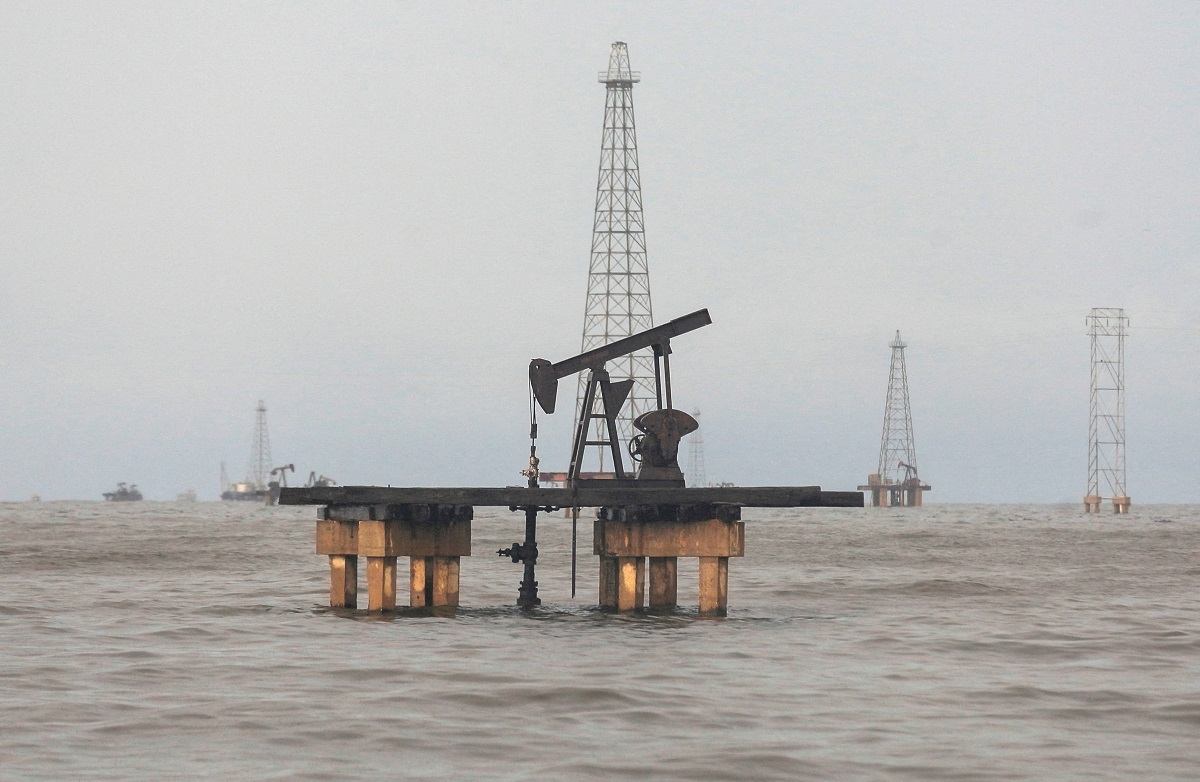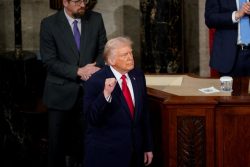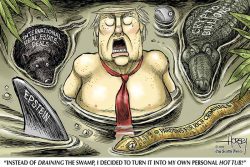
An oil rig is seen on Lake Maracaibo, in Cabimas, Venezuela October 14, 2022.
16:54 JST, August 24, 2023
CARACAS/WASHINGTON (Reuters) – U.S. officials are drafting a proposal that would ease sanctions on Venezuela’s oil sector, allowing more companies and countries to import its crude oil, if the South American nation moves toward a free and fair presidential election, according to five people with knowledge of the plans.
Washington has been trying to encourage negotiations between President Nicolas Maduro and the political opposition over elections in Venezuela and other demands. Sanctions were imposed following Maduro’s 2018 reelection, which many Western nations considered a sham.
Easing sanctions has been a carrot held out in the past by the U.S., but which so far has resulted in very few authorizations, including one to Chevron CorpCVX.N that has allowed the firm to expand operations in Venezuela and export its oil to the United States since November.
Washington continues to insist that further easing will depend on progress toward elections. U.S. President Joe Biden’s government is prepared to provide Venezuela sanctions relief if the country moves to restore democracy, the White House said on Wednesday.
“Should Venezuela take concrete actions toward restoring democracy, leading to free and fair elections, we are prepared to provide corresponding sanctions relief,” a spokesperson for the White House’s National Security Council said.
A new round of talks began last November in Mexico including Maduro’s representatives, the opposition and U.S. officials, but have shown little progress. A White House spokesperson said Venezuela has not yet taken the necessary steps to restore democracy.
The White House declined to comment on the oil sanctions reframing proposal. Venezuela’s negotiation leader, Jorge Rodriguez, and the U.S. State Department did not immediately reply to requests for comment.
MORE OIL FOR MORE PEOPLE
The U.S. is this time considering a specific offer to reframe oil sanctions on the country so crude buyers in Europe and other regions also can resume imports of Venezuelan oil in a structured, organized way, the people said.
The proposal could require Biden to amend U.S. executive orders on Venezuela issued by his predecessor Donald Trump in 2019, or issue new ones.
If parties agree to it and to a series of political demands including the presidential election, the new sanction framework would only maintain restrictions to trade Venezuelan oil with countries including China, Iran and Russia, which are under separate U.S. sanctions, they added.
An early version of the proposal was rejected in July by Dinorah Figuera, head of Venezuela’s opposition-led National Assembly which controls the country’s foreign assets, after discussions with Venezuela’s main opposition parties, two of the people said.
The reason for rejecting the draft proposal, which could become one of the powerful U.S. negotiation tools in future meetings with Maduro’s envoys, was the lack of concrete steps by Maduro so far toward fair elections in the country, two of the people said.
Figuera’s office did not reply to a request for comment.
Rodriguez said in July that Venezuela would not accept international observation for any elections. The government has also banned prominent politicians from participating in an eventual election as opposition candidates.
Top Articles in News Services
-

Survey Shows False Election Info Perceived as True
-

Hong Kong Ex-Publisher Jimmy Lai’s Sentence Raises International Outcry as China Defends It
-

Japan’s Nikkei Stock Average Touches 58,000 as Yen, Jgbs Rally on Election Fallout (UPDATE 1)
-

Japan’s Nikkei Stock Average Falls as US-Iran Tensions Unsettle Investors (UPDATE 1)
-

Trump Names Former Federal Reserve Governor Warsh as the Next Fed Chair, Replacing Powell
JN ACCESS RANKING
-

Producer Behind Pop Group XG Arrested for Cocaine Possession
-

Japan PM Takaichi’s Cabinet Resigns en Masse
-

Man Infected with Measles Reportedly Dined at Restaurant in Tokyo Station
-

Israeli Ambassador to Japan Speaks about Japan’s Role in the Reconstruction of Gaza
-

Videos Plagiarized, Reposted with False Subtitles Claiming ‘Ryukyu Belongs to China’; Anti-China False Information Also Posted in Japan























